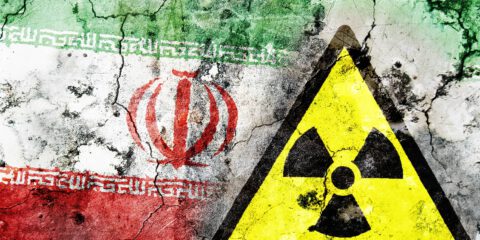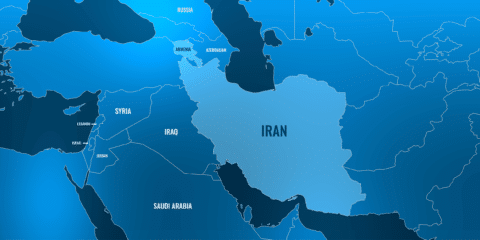Israel must not show restraint in the face of the first-ever direct Iranian attack on its soil. It must seize the opportunity and launch a broad strike on Iran to restore its deterrence and send a strong message to the region and the world. The absence of an Israeli response will confirm the perception that its deterrence is eroding and will invite aggression. Israel’s neighbors and enemies are now examining its conduct. An Israeli attack would send a resounding, deterrent, powerful and unequivocal message to Iran and the entire region (especially after the October 7 attacks) that any attack on Israel will come at a very heavy price.
Iran’s unprecedented attack on Israel is a declaration of war and that is how Israel should understand the event. The attack, in the early hours of April 14, was the first time that a foreign power launched a direct attack on Israel since 1991, but it was on a scale not seen since the 1973 Yom Kippur War. Israel is the first country ever to face a large-scale attack involving drones and cruise and ballistic missiles, and it has done so with tremendous success.
The Iranian attack indicates a dangerous shift in the security policy of the Islamic Republic. Since the Islamic Revolution in 1979, Iran has stuck to the rules of the game and adhered to red lines vis-à-vis the United States and Israel. Due to Iran’s inability to compete on the conventional battlefield with Israel, Iranian policy has been based on establishing, arming, training, and maintaining proxies throughout the Middle East, with the aim of creating a “ring of fire” around Israel. This policy aimed both to wear out Israel’s population and as a deterrent in case Israel or the United States decided to attack its military nuclear project. Over the past decades, when Iran wanted to respond to actions against it by Israel or the United States, it employed its proxies in order to allow it room for denial and avoid an Israeli or American response on its territory.
Over the past decade, Iran has developed and built up relatively advanced military and technological capabilities, with considerable investment, mostly in the Revolutionary Guards. This investment is reflected primarily in its missile and space forces, while Iran’s air force remains relatively weak. The missiles in Iran’s possession have apparently given it a sense of military might. The Islamic Republic’s self-confidence is growing in light of strengthening security cooperation with China, and all the more so with Russia in its war in Ukraine. The conciliatory foreign policy of the Biden administration has also contributed to Iran’s sense of security.
In recent years, Iran’s level of daring has risen, and it has escalated its steps. In September 2019, Iran attacked the oil facilities in the Abqaiq and Khurais fields in Saudi Arabia, without claiming responsibility. In response to the assassination of Qasem Soleimani, the commander of the IRGC Quds Force in January 2020, Iran attacked a US Air Force base in Ain al-Assad in Iraq and another base in Erbil in Kurdistan with 16 surface-to-surface missiles. It was the first time Iran had attacked American targets. However, it should be emphasized that the attack was carried out on Iraqi soil.
Now, Iran has taken things to another level by attacking Israeli targets in the State of Israel itself, on a large scale, with a variety of capabilities, and claiming full responsibility. This is in contrast to assassinations attributed to Israel, which has never admitted carrying them out. This is a significant escalation in the conflict between the countries.
From the Israeli perspective, the April 14 attack attests to the failure of its deterrence, which, in recent decades, had seemed successful. Iran may have thought that Israel was weak in light of its strategic and operational failure on October 7, and because of the split in Israeli society before October 7. The significant weakening of international support for Israel in its war against Hamas in Gaza may also have contributed to the erosion of deterrence.
According to the IDF, Iran fired 180 explosive drones, 36 cruise missiles, and 110 surface-to-surface ballistic missiles (with warheads weighing about 400 kg). Most of the launches were from Iranian territory, and the rest were launched by Shiite militias from Iraq, Hezbollah from Lebanon, and Ansar Allah (Houthis) from Yemen.
Iran tried to paint the attack as being of a limited nature by targeting military bases (especially the Nevatim air base, which, according to Iran, served as a base for the strike that killed Quds Force General Hassan Mahdavi in Damascus and served as the trigger for Iran’s attack on Israel). Nevertheless, an Iranian ballistic missile attack on targets in Israel constitutes a very significant escalation.
Despite the unprecedented scale of the attack, it failed in the face of a historic operational-defensive achievement by the IDF. Some 99 percent of Iran’s launches were intercepted before they reached Israeli airspace, with only minor damage to the Nevatim base). The defensive achievement stems not only from the number of interceptions but also from the variety of attack means (drones, cruise missiles and ballistic missiles), from several arenas and angles simultaneously (Iran, Iraq and Yemen).
Another achievement for Israel is the international and regional cooperation in the face of the attack. The regional defense alliance established in the wake of the Abraham Accords, under the auspices and leadership of the US Army Central Command (CENTCOM), operated impressively. The cooperation included inter alia the use of radar systems and interceptor launchers by the United States, Britain, France, Jordan, and other countries in the region.
Israel now has greater international legitimacy to confront global terrorism, as well as to attack Iran (although the United States and its European partners have reservations about this). Thus, Israel now has the possibility of significantly damaging Iran’s military infrastructure, and perhaps even its nuclear program.
JISS Policy Papers are published through the generosity of the Greg Rosshandler Family.
Photo: IMAGO / Xinhua









 - בניית אתרים
- בניית אתרים